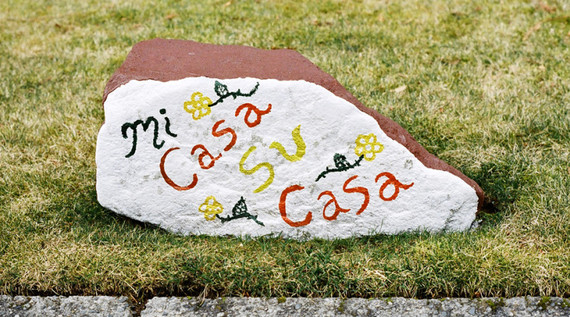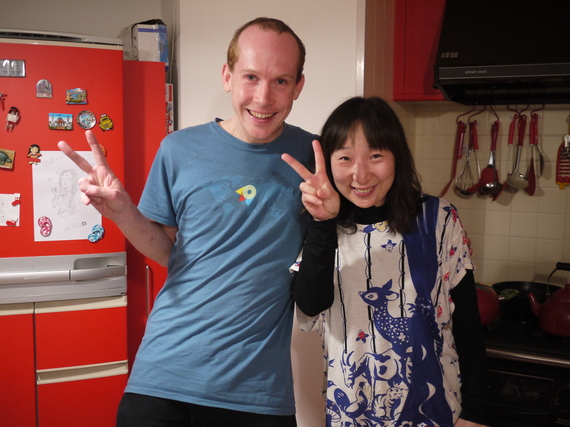Especially if you've never hosted before, it's time to make this thing happen. Take it from several Airbnb Superhosts.
Who better else to ask? I interviewed several of these people to see what set these hosts apart and so other hosts can become the best hosts that they can possibly be. (Note: I am also a Superhost.) Everyone hailed from Boston to San Francisco and listings ranged from super budget to super fancy. The most common theme? It seems like the best hosts are professional, easygoing and attentive. And know where to draw the line with guests.
This post originally appeared on Map Happy.
Each Superhost asked for anonymity because the majority still rented from landlords. Please keep in mind legal issues should definitely factor into hosting.
How do I become an Airbnb Superhost?
Superhosts have basically perfected the art of hosting (and make Airbnb a lot of money). There's a couple of requirements in order to qualify:
- Host at least 10 trips throughout their listings in a year.
- Have a 90% response rate or higher. (This is calculated how quickly you respond within a 24-hour period. Responsiveness is super, super important!)
- Get 5-star reviews on at least 80% of reviews. (Half of guests must also actually review the host).
- Never cancel. (Extenuating circumstances don't apply.)
Set clear expectations
The more detailed the description is, the better off everyone will be since each Airbnb host is so different. Even if it seems obvious, there is no harm in restating the obvious.
Hosts often neglect to include the small details. Here are some things hosts rarely cover in their Airbnb listing:
- Is the guest sharing the apartment with the host? Will they be sharing the apartment with any other guests? If they are, how many will there be? Does the host work at home?
- Does the apartment require the guest to climb up a series of stairs? Is there elevator access? This is going to be an issue for people with physical handicaps.
- Is the place service-animal friendly? (Occasionally, people travel with dogs.)
- Is there construction going on around the apartment and/or area?
- Is the area noisy or is the apartment located right next to a bar?
- What type of furniture is in the room? Is there a desk? Is there a window/no window?
- How flexible are you with outside and/or overnight guests that the Airbnb guest may bring over?
- What is the parking situation like?
Don't accept everyone off the bat
There are ways to be subtle about it:
Hey, thanks for reaching out! Did you have any questions about the listing or the house rules that I can help with? Just want to make sure everything's clear about what the property does and doesn't offer. :)
This response will usually prompt the guest to reread the listing to check/read more carefully if there is something they missed. Guests that ask a lot of questions beforehand tend to be the problematic, but keep their responses in context with regards how detailed the information on the listing is. (I'm definitely going to ask if there's not much information available.)
Give a proper tour around the area
Even if you aren't able to be around to greet them, make the effort to say hello as soon as you can. This is especially important if the guest is sharing the property with the host, even if it's in a separate unit. There's no worse feeling than like you can't relax somewhere or like you have to avoid your host.
I'd also often give them a full tour and explain the intricacies of the apartment, and take them on the roof to give them an overview of San Francisco if they weren't familiar with the city. From there, I'd go over city attractions and key neighborhood landmarks--like the grocery store--that they might be interested in and answer any questions. One Boston Superhost I knew often personally walked around the neighborhood with her guests to show them every place they needed to know.
This brings up another point: It's a FANTASTIC idea to provide a small, local written guide for guests that may include airport transportation options, good nearby restaurants, grocery and laundry options, public transport (including how much it may cost) and a quick house manual that includes the Wi-Fi password in case they forget it.
(Most people pretty much just do this manually in Word and throw it up on the house manual but there are a bunch of new apps like Coral that try to make this process simpler.)
For full apartment rentals, I've noticed hosts tend to never come by. In those cases, personal interaction is often a lot less relevant to most reviews. In those cases, reviews tend to reflect the amenities and perceived value.
Treat it like a business
If guests are ever inconvenienced because of me--like I need them to check out early--or because I personally made a booboo, I often offered a fairly reasonable refund proactively before the stay was over to make up for the trouble.
If the house is constantly in demand, it's also a good idea to be aware of your own personal tolerance for hospitality. Be sure to block off weeks to yourself; both you and your guests will be happier for it. It's also better than driving review ratings down because you're tired and can't get a break. Most Superhosts I know limit their listings to one or two solid weeks per month.
On pricing: Guests pay the fees and its important to take that into account. Satisfaction is based on perceived value (not actual value). All the Superhosts I talked to ran different kind of properties, from budget listings to fancy digs. If many guests aren't leaving five-star reviews, that means guests don't think its a great deal. Consider lowering the price.
Going above and beyond
If the apartment is meant to be functional, breakfast may not be provided. But offering guests a few cups of coffee or tea every now and then definitely doesn't hurt.
One particular host I stayed with not too long ago offered guests access to his Monterey Bay Aquarium membership passes for a small fee. Because of his generosity, we saved a full $60 on the price of tickets.
Read More:
- Better Read This Before You Use Airbnb For the First Time
- How To Perfect the Art of Haggling on Airbnb
- The Rules of Airbnb Sex

